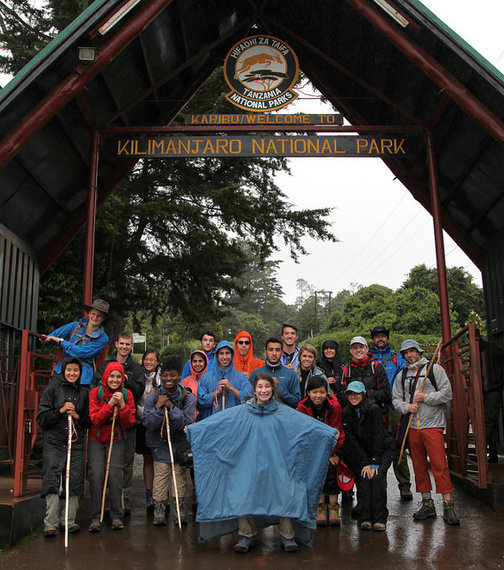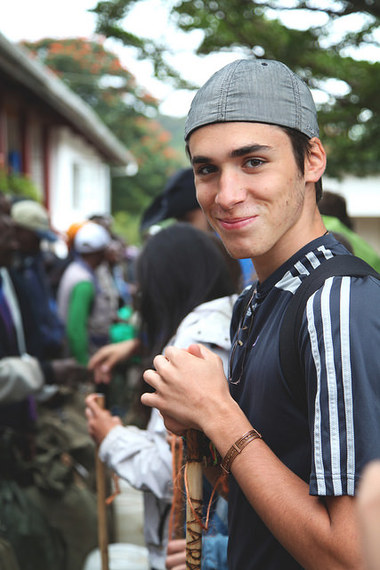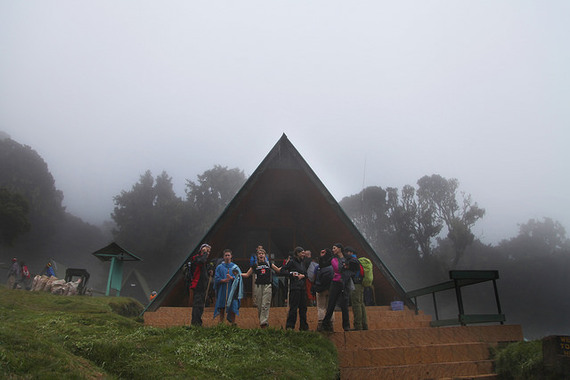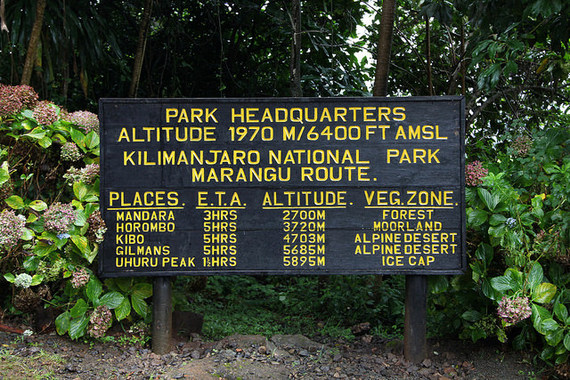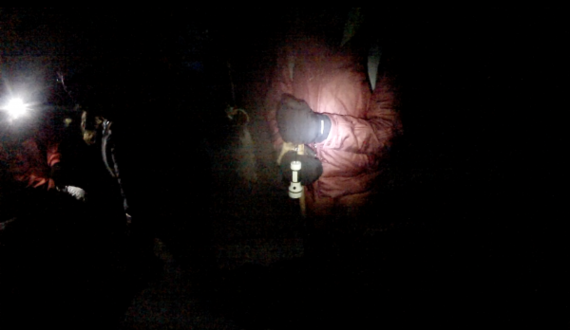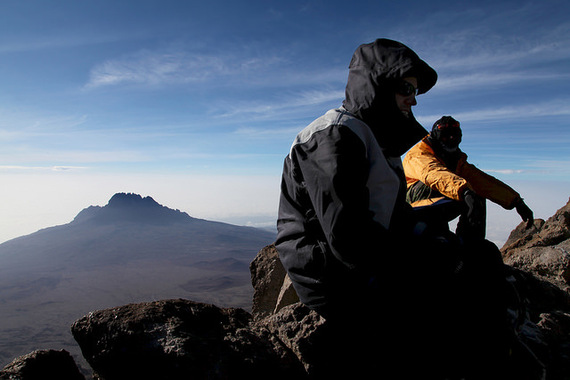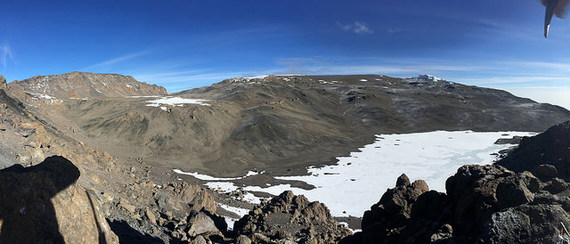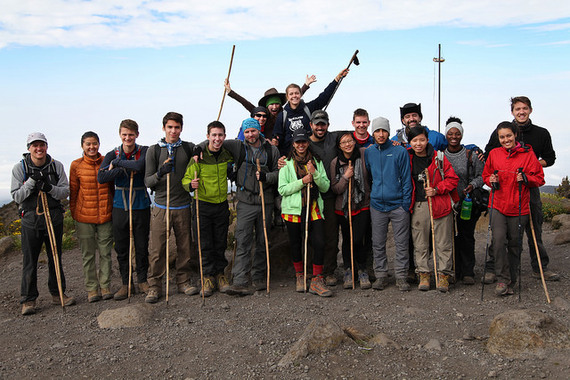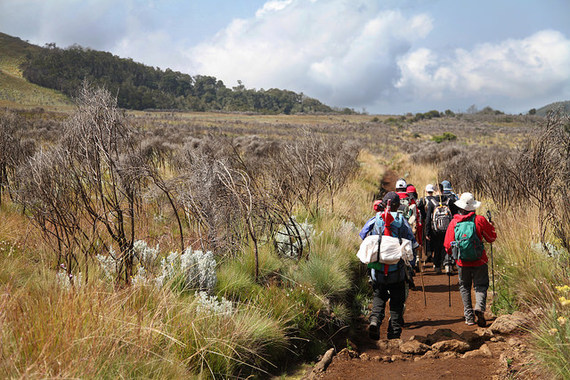Shoving 100 wet wipes into a skinny bag with 3 liters of water, rain-proof pants, and the day's lunch isn't easy. Though my work "uniform" often calls for a back-bending pack of gear, I felt like a fumbling mess trying to make this little daypack of mine close. Tucked under the awning from the misty rain, I tried to pull myself together, baggage- and emotion-wise, to start mobilizing a group of teenagers toward a mountain.
Indiana does not typically breed the world's most daring adventurers, and I never had realistic expectations of mountain climbing growing up; I think my hardest physical challenge from 3rd to 5th grade was trying to master the toe-touch jump. It never happened, well.. except maybe on a trampoline, but that doesn't count.
These days my realistic expectations of daring feats have nothing to do with most people's sense of reality. The realities of many of my friends and family back at "home" often involve children of their own, homeowner woes, and Disney cruises. It's here, in this polar opposite work world of THINK Global School, that a late night email can inform me that I'm participating in a bucket list opportunity.
"Ahh, the classic Kili spine twist. Breathe everybody! Breathe into the stretch!"
My technique as a supervisor of international adolescents is to be utterly silly, and then somehow they listen to me, probably in pity. In the hours leading up to our ascent of Kilimanjaro, I pulled the kids into a circle to do some stretching. Behind us, somewhere past the mist and foliage, sat a gargantuan mountain that was going to drain us of our egos; sitting in her shadow, our circle felt miniscule in comparison, but we had to do something to calm our mounting nerves. We had to muster up all the courage in our reserves.
We stood back up from our stretches before the spitting rain could dampen the ground and our bums. Fifty-five Tanzanian men assembled into a line and stepped out to introduce themselves, followed by a quick utterance of "...morning." If they were apprehensive in the least, it was unbeknownst to us.
The porters --all local men from Moshi, topped with baseball caps and anchored with sneakers-- were busy weighing bags and steel boxes of kitchen supplies, careful to limit their load to nothing greater than 20 kgs. Our climbing task seemed meager in comparison to their job of lugging our gear to high altitude. Feeling guilty for engaging in a task that required a personal porter, I was glad that I'd triple-checked my bag earlier for any superfluous items. My reverence for Clinton, my porter, grew ever greater on a daily basis; reverence that I tried to show with many double-handshakes through a debilitating language barrier.
I tossed on my tiny daypack and headed to the national park gate for registration and launching. Our assault on the summit was within sniffing distance, no longer a hypothetical challenge.
It was time to test a lot of things, most of which remained unknown.
Ascent
Within a minute of commencing the climb, I was glad I splurged on a rain hat. Those first four hours-the ones spent whistling and casually chatting-subjected us to unrelenting jungle rain, which showered us with water from unexpected places-dripping mosses high up in the trees and flicking ferns-as we forged onwards. For a time, I walked alone and excitedly wondered if anything in this African wild could kill me.
I could already feel my stomach respond to being 2,000 meters above sea level, and I craned my neck around every bend, yearning for a secluded spot to seek relief. The physical toll from the start had everything to do with the effects of high altitude: headaches, stomachaches, and other maladies ranging from the annoying to the life-threatening. Throughout the forest and the moorland, I popped pills as nonchalantly as I would a handful of almonds. Downing so many pills certainly didn't feel healthy, but it felt quite necessary to sustain myself. Regardless of water intake, I had a headache, reminding me of the magnitude of our challenge.
Surprisingly, the walking was easy, always beautiful, and enjoyable. The air was delicious, the views serene and photogenic. My feet were thankfully blister-free, and all I could think of was:
"Man, I'm glad I worked those fire escape stairs..."
My training in our Hiroshima hotel had paid off. I felt capable of doing well as long as my body could stop reacting to the ever-increasing altitude and ever-decreasing oxygen supply.
On the evening of day two, against my strongest wishes, my head was throbbing. The lasagne on my plate seemed to be one unified consistency and without flavor to my compromised taste buds. Sadly, I had to retire early for the night, and I missed the view of a nearly-full moon floating above a cloud blanket below us. The kids took the opportunity to marvel at the landscape before bedtime.
Day three was prefaced as being "the disheartening day" for the howling, cold winds and long stretches of land that seemingly never shorten, but I shared some lovely walking moments with many of my pals. We marveled together at the first unobscured sighting of our destination. We shared iPods and old favorite songs in the wasteland of the Kibo/Mawenzi saddle, the space between the two Kilimanjaro peaks. The students surprisingly went along with my self-absorbed renaming of Mawenzi to MaLindsay and referenced it with every glance eastward.
Many students refrained completely from technology or taking pictures, preferring instead to connect completely to the power of nature that surrounded them. It probably helped that they had two photographers trekking with them.
The ascent presented quite a few debilitating challenges --sun exposure, wind exposure, high altitude, blisters, dehydration-- but their effects were hardly visible in these teens. I witnessed incredible grit in those fifteen [former] students, none of whom were weathered mountain climbers nor even teenagers who'd had adequate sleep for the two months prior. They looked out for each other and pushed through the monotony to savor the specialness of the opportunity.
Reaching the third hut meant we arrived at our highest sleeping elevation. In the next handful of hours, we were expected to eat dinner, attempt to get some hours of (disorienting) sleep, and arise before midnight to brave the final stretch. The peak's looming presence was daunting to say the very least, and it was at this time, after dizzying bathroom stops and an early dinner, that many strong-willed students finally voiced the unspoken as of yet: they were scared.
My high altitude memory fails me when I try to remember if I shared my fears or whether I pretended to be absolutely thrilled for the adventure ahead, trying my best to be a support system. I believe I went with the latter, exaggerating my eagerness to the point of clear posing, and then immediately went to bed with some melatonin and an Inception-like dream that had me fake-waking up every 20 minutes with anxiety.
Switchbacks
Lined up like a Goretex-covered centipede, fifteen students and six staff members assembled outside the hut to begin what was supposed to be a six-hour trek to the summit by sunset. Sixteen guides surrounded us like the stars on an Indiana flag, awaiting any visible signs of high altitude sickness. They loomed like protective superhumans, seemingly unaffected by the altitude or cold.
We were finally in the "extreme high altitude." I saw our mental switches go from "I got this" to utter reverence of our planet.
Within five minutes, we stopped. Man down. Man recovered. A few minutes later, another fell out of line. Some felt dizzy. Others felt nauseous. All I could do was stare at Charis' backpack and hope that I had it in me to follow each footstep with another until the Earth finally leveled. My dizziness felt mild enough to ignore, but it felt like a thick film around a functioning mind.
We were taking longer than was anticipated with all our stops and starts, so the group decided to split up into a "Steady" group and a "Pole, pole" group. I shuffled over to the slower group, since each pause in our ascent afforded me time to ward off the dizziness.
One student in the back of the line raised his hand for the "Steady" group and then proceeded to fall to the ground. A nearby headlamp illuminated his face to show unfocused eyes, and emergency oxygen quickly came into view.
The adventure became real. I watched my ego drop and roll down the volcanic scree.
Here, in the full moonlight on the roof of Africa, we were humans with the same unpredictable chances of falling ill from the pressures of this extreme environment. It was equal parts scary, surreal, beautiful, insane, and special. I suddenly craved pot roast.
The student and one staff member scrambled back down the mountain face with a couple guides before we could even wrap our heads around that reality. The TGS twenty-two became twenty.
After seeing one student descend, some in the "Pole, pole" group started to see that fate as their inevitable fate. With the distance downward ever-growing and the summit nowhere in sight, doubt became the predominant emotion, to which I responded with lies: "Guys, it's closer to the top now than it is to the bottom. If you summit, not only is it the shorter walk now, but you can go back down in the daylight, which will be faster and safer."
I looked at Pema, and she looked at me. Both of us knew this was a big ol' lie. Not only did I have no authority with which to say such things, but clearly summiting at this point was the tougher route. Oddly enough, I don't think I would have gone any further from this point if I were just a regular climber, if I didn't have a role to fill.
With these white lies, it became clear to me that climbing Kilimanjaro is completely mental. My leg muscles didn't burn the way I thought they would. Other than my head and belly, my body felt strong and fine. But an able body was not the most important asset for continuing up that huge, dark, daunting incline. I turned off my mind to simply put one foot in front of the other and to encourage others to do the same.
Before we even hit the halfway mark of the ascent, another student showed signs of high altitude sickness and descended the mountain with more guides and another staff member. Twenty became eighteen. Again, we had to drown the doubt mounting in others with positive thinking and a few more white lies. The tea break offered a chance to warm up and reboot, as well as a chance to learn we were capable of being so tired we could fall asleep sitting up and holding full teacups.
The snaking footpaths in the final hours seemed infinite, but it was here where we witnessed the sunrise - a muted, clouded light change that backlit MaLindsay. We paused... and then continued on shuffling.
The scree gave way many times under my feet, prompting one student behind me to push my insulated bum back up and our guide to pull up my grasping hand. Once I was back on my feet, Kili Guide Alex didn't let go.
With every switchback, we switched hands and tightened the grip that kept me upright and moving on the mountain face. At first, this assistance made me feel like a weakling, assistance I would have hissed at in my childhood for fear of being mocked by the neighbor kids. But since my ego had left me at 5,000 meters, I turned back to Charis behind me and winked, pretending like this was a lovely excuse to hold a fella's hand.
My memory of the final switchbacks is fuzzy. Had I been mentally engaged and thinking about this experience, I would have face planted in the gravel at the start. I wasn't truly there to feel the discomfort. The altitude wouldn't let me truly be present to my own greatest physical feat.
I heard voices from above and craned my head to see the end of the "Steady" group. Without conscious effort, our two groups converged, clearly demonstrating to us that acclimatization was successful at one rate, and that wasn't a rate anyone could rush.
Summit
Kili Guide Alex, my knight in puffy red armor, released my hand only when both of my feet were firm and level at Gilman's Point, an access point to the crater rim. I heard the hoots and hollers of chilly, accomplished teens, but I couldn't see them. I had to hang lifelessly for five minutes on my walking stick before realizing how far we had come.
There were smiling selfies and high fives circling. There were bodies slumped on the rocks and on each other, bodies unable to fully express the emotions felt somewhere amidst the high altitude cloudiness.
I had to remind myself I was there to capture this moment, this surreal moment on top of Africa. It was hard to take a step back from the feeling of accomplishment I shared with them in order to snap a photograph, just like I would on an "ordinary" work day. Of course, this wasn't such a day, not even when compared with work days at the Taj Mahal or in the Amazon rainforest. I wanted to bottle our shared pride and pause the moment so that I could savor it at a later time that afforded more mental clarity.
It was all we could do to simply smile, pose, pee, and head back down the mountain without falling asleep on the dramatic slope. Dancing was twice as hard with half as much oxygen present (although thrice as hilarious to film).
And after no more than twenty minutes of "celebrating," we grabbed our daypacks and carefully took the first steps downhill. Before we knew it, we moved on from the destination in our dreams.
Descent
Kili Guide Alex was the only one left on the summit with me when I returned from the highest land "bathroom" I've ever used. He didn't want to risk anymore of my swerves and teeters on the shifty scree, so he grabbed my hand yet again and descended.
I was slow. I paused often to drink water. He grew impatient.
Pushing my hand toward a different direction, Kili Guide Alex led me square off the mountain face, straight down the slope. One footstep would push wheelbarrows full of little volcanic rocks down, obscuring the switchbacks like a toothpick through latte foam. In seconds, I was meters lower without much effort at all.
I was skiing! No... I was screeing!
David's face, as I flew past him, was one of worry. I exclaimed in passing, "I think he thinks I need to get down fast." Kili Guide Alex's explanations were cryptic and ended with, "Let's go," so I kept on screeing, pausing only to rest my seldom-exercised skiing muscles. In a fraction of the time it took to labor up the mountain in the full moonlight, I was back at the hut, pants and boots covered in the dust of an earth-changing eruption of another era.
Even though we made it back down to a lower altitude, the effects still wrecked our bodies and pushed us to keep going. Those of us who could stomach it scooped up the warm meal they had prepared for us at the hut-of all things, pot roast-and then retraced the path to our home amongst the clouds. It was here where we rejoined some of our fallen soldiers, who instantly recovered at the more pleasant elevation.
Morning greeted us with cups of warm tea and diminished headaches, our bodies no longer as exhausted as they were on summit day. We were invigorated enough to celebrate. A round of group photos, hugs, and giggles started us off on the final day of the descent, one that took us from God-like heights above the clouds through the moorlands and into the jungle. Blisters grew like sixth toes, but we didn't care. A little limping at greater speeds meant relief was that much closer.
Running through the jungle and using two walking sticks to pole-vault over tree roots, I found myself alone with my mind. This body enabled the adventure for me, and my mind held up in spite of the pill-popping and hostile environments. I managed to survive AND support, against quite strong though unspoken self-doubts.
A monkey squeaked in the trees. I gasped and stopped in my tracks. A couple minutes later, I spotted a woman in a clearing. I slowed down, blinked, and waved. It was difficult to accept being back in society all of a sudden, but her wave in response felt like victory.
Hanging up the boots
Freshly scrubbed and clothed like a lady, I sat on a porch at the Hotel Marangu writing postcards to the young adults with whom I had just shared a summit. A large bee swooped toward a flower at my side and nuzzled its stamen while still afloat. I watched it with full interest. It looked more like a small hummingbird than an insect. Murmurs from nearby conversations were muted by the sound of its buzz. Another huge insect darted to my left.
I only had eyes and ears for nature.
I think technology is great, even though I know that distance from it (and modern society) gives me super senses and less anxiety. Five days with nothing but a camera, fellow trekkers, and nature managed to scrub the grime off my windows to the world. Of course, I don't know to what extent exhaustion skewed my focus toward the little or the natural things. I was absolutely knackered, as the Kiwi says.
As were the kids. Our previous month was draining: a mountain trek, an overlanding adventure, an international flight, an emotionally-overwhelming graduation weekend, an Amazing Race through six cities in Japan, and of course, the culminating exams of their high school career. Imagine the packing involved. And the mental rigor. And the goodbyes.
If you're lucky, many of the stories you live through will feel so powerful that the task of retelling them feels too great. This story was one I couldn't detach myself from. I couldn't see the adventure through the students' eyes, because it was already too consuming through my own, too challenging and new, and I felt like a student myself.
We all left feeling a great sense of accomplishment, a knowledge of our limits, an awareness of our raw humanity, and a strengthened sense of ubuntu, to be quite specific. These lessons will inspire different steps for each of us toward new challenges --new charities opened, personal goals never before considered, physical feats previously considered just for those fit people or those from Colorado-- and I'm really excited to see where those steps lead to in the years to come.
Follow Lindsay Clark on Twitter @nomadderwhere
